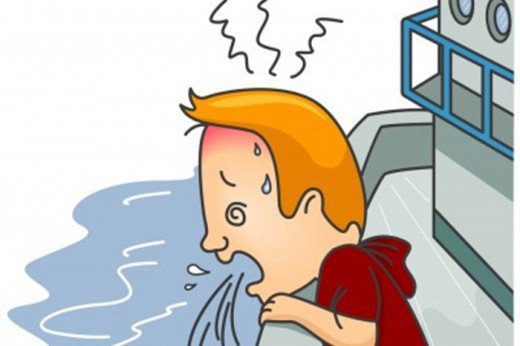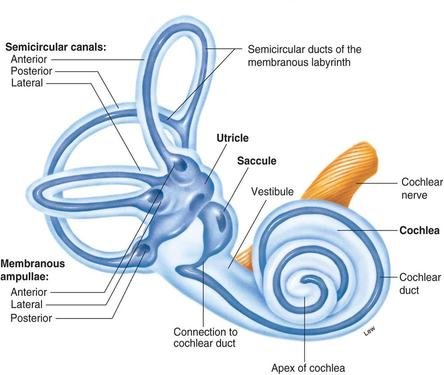MOTION SICKNESS - facts,science and the truth
Have you ever been moving in a car, boat, train or plane and you feel nauseated, irritated or sick to the stomach and you feel like you are going to drown, well that's probably because you are part of the 1 third in the population who gets motion sickness.

source
The most common theory there is for the cause of motion sickness is Mismatch Sensory Signal. The Mismatch Sensory Signal is caused when the two main sense organs(the eyes and the ears) in the body responsible for balance during movement are not corresponding i.e. when you are in a moving transport, your eyes are seeing the inside of the vehicle which tells the brain you are still, while the ears are feeling the motion which also tells the brain a different information that you are moving(these function of the ear is carried out by the vestibular part of the ear which gives the body a sense of balance).
This is a group of system that lies in the inner ear and gives the human the sense memory information about motion, equilibrium and balance. The vestibular system consist of three main parts;

source
- Utricle
- Saccule
- Semicircular canals
The Utricle and Saccule detects gravitational information and linear movement while the semicircular canals detects rotational movements, there are three semicircular canals and each consist of fluids called ENDOLYMPH which moves when you move you move your body and tickles the ear thereby relay the information of your movement/position to the brain, with all this combined, it makes the body understand; - How much you have moved
- What angle you have moved
- What position you have moved
Your mind takes in this information, and it as a rule meets up and bodes well. Be that as it may, some of the time your cerebrum gets befuddling signals.
On a flying plane, for instance, you have an inclination that you're moving, yet your eyes tell your mind that you don't give off an impression of being going anywhere. The inverse is valid too. After a long ocean voyage, you can stop on dry land yet at the same time feel like you're moving.
The same can happen while watching motion pictures/movies but this time it's the eyes that thinks you are moving while the ear feels you are stable.
A few people are somewhat more prone to get it than others, but it usually happens to everyone:
• Ladies, particularly when they're discharging, pregnant, or on hormone treatment
• Individuals who get headaches and migraines particularly when they have one
• Children ages 2 to 12
• Individuals who take particular sorts of meds - a few anti-toxins, opiates, asthma prescriptions, antidepressants, and even normal over-the-counter medications like ibuprofen or naproxen
Motion sickness is very swift and its main symptoms are nausea and vomiting, cold sweat, dizziness, headache and migraine, increase in salivation, loss of appetite, pale skin, tiredness, and shallow breath.
Nausea and vomiting
Nausea is the feeling of discomfort in the pit of the gut and digestive system that is associated with a revulsion for food and an expectation of wanting to throw up.it can be an antecedent to regurgitating the substance of the stomach.Dizziness
This is a feeling that you have that everything is spinning around and you have no balance, this is also a whirling sensation that gives makes you light-headed and might cause you to fall.Headache and migraine
This is the symptom of pain in any part of the head and neck and it could be light or sharp while migraine can be characterized by painful recurring headache which might accompanied by nausea and vomiting.Increase in salivation
This can also be called hypersalivation, this is caused when there is an increase in the production of saliva from the salivary gland and its characterized by a sour or almost tasteless salivary fluid in the mouth, the body usually deal with this by swallowing more.Loss of appetite
This is when a person has a reduced desire to eat, it can occur due to the irritated feeling of nausea.Pale skin
This is the unusual lightness of skin colour and can be caused by reduced oxygen supply in the body.Tiredness
The person feels weak due to the fact that the body is all worked up trying to get itself back to balance.Shallow breath
This occurs when a person takes more breath than normal. This can be called hyperventilation and can occur due to tiredness.Relax
When you get wind of this feeling, first thing to do is to try to make yourself comfortable as possible, you can take a deep breath, close your eyes or lie down. Keep your body still as possible and don’t stare ahead, read or use your mobile phone.Looking at stable objects
In cases of seasickness, looking at the horizon helps a lot.Distraction
Finding a distraction that would not cause you any problems such as, chewing gum, eating some snacks.Take in fresh air
This helps a lot in ensuring oxygen circulation throughout the body, if you are in a car, try as much as possible not to depend on the air conditioning system, but open the windows to allow fresh air to caress you as this is a personal experience for me.Eat light food
Do not eat too much and avoid eating heavy food before embarking on any journey as food in the GIT (gastrointestinal tract) could cause nausea and thereby lead to vomiting.Find a comfortable spot
When in a car it is better to be in the front sit either as a passenger or as the driver.Taking pills or medication
There two main medications that are widely used to curb the issue of motion sickness.
• Antihistamine: most common first generation antihistamine drugs can greatly reduce the effect of motion sickness, this drugs are mostly over the counter and can also be prescribed by a physician. Some common antihistamine includes Allegra (fexofenadine) Astelin and Astepro (azelastine) nasal sprays, Atarax and Vistaril (hydroxyzine), Benadryl (diphenhydramine), Chlor-Trimeton (chlorpheniramine), Clarinex (desloratadine), Claritin and Alavert (loratadine), Cyproheptadine.
• Scopolamine:this is another type of drug that can be used to manage motion sickness, this is an alkaloid drug inform of an adhesive patch that is being put behind the ears for some hours before entering into a situation that would cause motion sickness. This is a prescription drug.















Hi, @gbindinazeez. There are a few things that in my opinion you can improve and implement in your next article to make it good.
The way you wrote your article is, in my opinion, too rigid. Let loose your creativity juice a bit. Make a story or create a situation and briefly explained regarding that according to the topic you want to discuss. It would be interesting that way.
Most of the images used in this article were copyrighted. You need to use free license images or any image which has been permitted by its original author to be used. Please refer here if you're not familiar with what I was talking about.
It would be good if you can give some credit to your sources by citing them as your references. It's a courtesy to gives credit where credit is due.
Keep it up and write a good article. Keep on educating the masses.